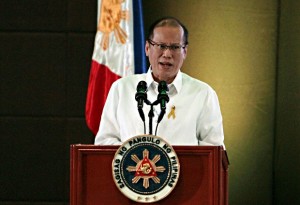Consumer group: Granting Aquino additional authority may result in higher power rates
MANILA, Philippines — A militant consumer group opposed the granting of emergency powers to President Benigno Aquino III in a bid to resolve the looming power shortage in 2015.
In a position paper submitted before the House of Representatives energy committee on Monday, the People Opposed to unWarranted Electricity Rates (Power) said granting the President authority for short term and expensive negotiated contracts may result in higher power rates.
“While we are for giving back to the government the authority and capability to put up its own power plants in the long term, we believe that allowing the President to enter into expensive, short-term negotiated contracts to address a questionable shortage is a big burden on taxpayers and consumers that will not solve the chronic supply problems ailing the power industry as a whole,” the paper read.
Citing figures from the National Grid Corporation of the Philippines (NGCP), the group said there is a buffer reserve of 2,338 megawatts (MW) to 3,187 MW in the summer months of 2015.
“Yet (Energy Secretary Jericho) Petilla says we are facing a shortage of 300 MW to as much as 900 MW,” the paper read.
Article continues after this advertisementThe group said the Department of Energy (DOE) still failed to inform the lawmakers on the actual deliverable capacities of power plants.
Article continues after this advertisementThey also said the DOE has not informed the chamber of the reasons some power plants cannot deliver on their dependable capacities.
The group expressed fears that the country may experience another power rate hike that happened early this year which was allegedly a result of collusion among power players to jack up prices.
“Such data is needed for us to verify the projected shortfall and whether the solutions offered will address the problem. We are afraid that with [those absent data], the public will be vulnerable to the kind of manipulated price spikes that victimized consumers during the Malampaya shutdown of November 2013 plus the notorious take or pay provisions that will accompany the planned emergency contracts,” the group said.
The group said the DOE only managed to prove that only reserve supplies and not the general power supply “will be at critical levels.”
“This is hardly a reason for granting the President emergency powers for negotiated contracts, resulting in big and unnecessary burden to taxpayers and higher power rates for all,” the group said.
President Aquino has asked Congress to grant him the authority to contract additional capacity precisely to address the looming power shortage during the summer, as granted to him under the Electric Power Industry Reform Act (Epira).
Epira allows emergency powers to the President “upon the determination by the President of the Philippines of an imminent shortage of the supply of electricity.”
“Congress may authorize, through a joint resolution, the establishment of additional generating capacity under such terms and conditions as it may approve,” Section 71 of the law reads.
Petilla had said the agency is expecting as much as 900 MW shortage for Luzon in 2015, and that the President must contract at least 300 MW of the total shortage.
The agency had said the thinning power supply may be due to the looming El Nino phenomenon, the maintenance shutdown of the Malampaya power plant, increased or continuing outages of power plants, and the delay in commissioning of committed power projects.
The energy department had told the committee that at least P9 billion will be needed to purchase generating sets and P6 billion to rent generators.
Another option to resolve the power crisis is through the Interruptible Load Program (ILP).
Under the ILP, big industrial and commercial customers who have the ability to produce their own electricity through generating sets should cut off or reduce their supplied electricity, particularly during peak periods of the day, and instead use their own generators.
This is to give way for the other customers who may need the power than the commercial users. The businesses are also required to contribute their excess energy reserves. But the program is only voluntary, and thus government cannot compel businesses to participate.
Instead of immediately granting Aquino’s request, the leadership in the House of Representatives sought an inquiry in aid of legislation on the need to contract additional power.
The lower chamber targets to pass the joint resolution on Aquino emergency powers by October 29, or before it goes on another break.
RELATED STORIES
Consumer group rebuffs looming power shortage, opposes additional authority for Aquino
